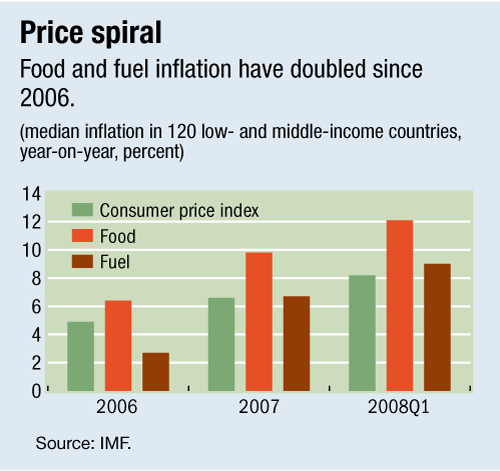
Typical street scene in Santa Ana, El Salvador. (Photo: iStock)
IMF Survey: Commodity Price Surge Boosting Inflation, Hitting Budgets
July 1, 2008
- Further oil, food price spiral could undermine some state finances
- Higher commodity prices have already boosted headline inflation
- Urban poor are most directly affected by higher costs of food
Higher food and fuel prices are having serious macroeconomic effects throughout the global economy, including adverse effects on growth and inflation, and creating large swings in the terms of trade—all with important balance of payments repercussions.

Rise in oil prices expected to have more severe effect on countries' balance of payments than food price increases (photo: Erika Koch/zefa/Corbis)
HIGH FOOD AND FUEL PRICES
Net importers of oil and food are being hit very hard by the commodity price shocks, with negative impact on their budgets, according to an IMF analysis—Food and Fuel Prices—Recent Developments, Macroeconomic Impact, and Policy Responses—published July 1. If oil and food prices continue to spiral, it could lead to unsustainable fiscal positions and undermine the health of government finances in some countries.
The price hikes have serious effects on poverty, both across and within countries; the implications for government finances and fiscal policy responses are considerable. The report provides a first broad assessment of the impact of the surge in food and fuel prices of a large sample of low-and middle-income countries.
Balance of payments impacts
The IMF study highlights three findings:
• First, the balance of payments (BOP) impacts from food and fuel price increases have already been quite sizeable over the past year-and-a-half. In low-income countries (LICs), for example, the study estimates that the gross impact of higher fuel prices during the January 2007-April 2008 period was more than 2 percent of GDP while higher food price impacts were 0.5 percent.
• Second, possible further increases in food and fuel prices in 2008 and 2009 suggest that a large number of countries are likely to encounter significant strains on their balance of payments. Using three months of reserves cover as one metric of reserve adequacy, the paper finds that 37 LICs and 25 middle-income countries will have a less-than-adequate reserves position after a combined food and fuel shock; a similar number of LICs and middle-income countries are also expected to be severely impacted using an alternative metric—in cases where a combined shock is as large as at least ½ a month of imports.
• Third, the rise in oil prices is expected to have a more severe and widespread effect on countries' balance of payments than food price increases. This is because fuel imports are, on average, 2 ½ times larger than food imports for LICs and about twice as large in the cases of middle-income countries.
But there is a wide variance in country-specific impacts. Low-income countries such as Benin, Eritrea, Liberia, Haiti, Togo, the Central African Republic, and the Kyrgyz Republic will be quite heavily affected—with shocks (in all these cases) equivalent to at least 1 month of import cover. At the other extreme, the study projects that some LICs will either face minimal adverse impacts or could actually be net beneficiaries—Cote d'Ivoire, Guyana, and Uganda, for example.
Inflation impact
Higher commodity prices have already led to substantial increases in headline inflation, and have been quite widespread and dramatic in both low- and middle-income countries (see chart). Across a sample of 120 non-member countries of the Organization for Economic Cooperation and Development, headline inflation jumped from a median of near 5 percent in 2006 to above 8 percent in the first quarter of 2008; food inflation doubled in the same period from near 6 to 12 percent.

Some states have fared worse than others. There are 18 countries where inflation, on a 12-month basis, has jumped by more than 5 percentage points since the end of 2007. In some cases, this has been the result of a fast pass-through of food and fuel prices, but high demand pressures have also been at play.
Food prices—rather than fuel prices—have the most dramatic impact on inflation. This reflects a high weight of food in the consumer price index, which on average allocates food a weighting more than five times that of fuel (37 percent versus 7 percent, respectively). Fuel prices can of course feed through to other prices through second-round effects, but the immediate impacts on inflation are still dominated by food prices.
Poverty impact
The urban poor are most directly affected by higher costs of food. The share of household expenditure spent on food typically far exceeds the direct share of oil-related products and services in emerging and developing countries.
In emerging economies, food's share of household spending typically exceeds 25 percent, and in developing countries it is often above 50 percent. In contrast, the amount spent on fuel is typically below 10 percent of the household budget; but this also reflects in part high domestic fuel subsidies in some countries.
However, the direct and indirect impact of fuel price increases on the poor is still likely to be large for the urban poor. The share of undernourished could also rise rapidly above the current 40 percent of total population in the developing countries. High import dependence, taken together with a high poverty incidence, increases countries' vulnerability to rising food prices.
Fiscal impact
Countries have resorted to a range of fiscal policy measures on both revenue and expenditure sides to mitigate the impact of higher prices [see "Policy Response: How Countries Can Cope"]. These policy measures come at a fiscal cost, which, in many cases, can be substantial. For about 29 countries, the fiscal costs already exceed 1 percent of GDP, with the largest increases driven by expansions in universal fuel price subsidies. Of the 79 countries that face higher fiscal costs, 50 are classified as vulnerable to balance of payments pressures.
In the coming months, the challenge for countries will be to refine their policy responses so that they become more efficient and effective. The IMF can help governments in assessing fiscal policy options to manage the costs of policy responses, while ensuring fiscal sustainability at the same time. These options will necessarily be country specific, depending on individual countries' macroeconomic situation and the ability to create the appropriate amount of fiscal space.
Comments on this article should be sent to imfsurvey@imf.org


